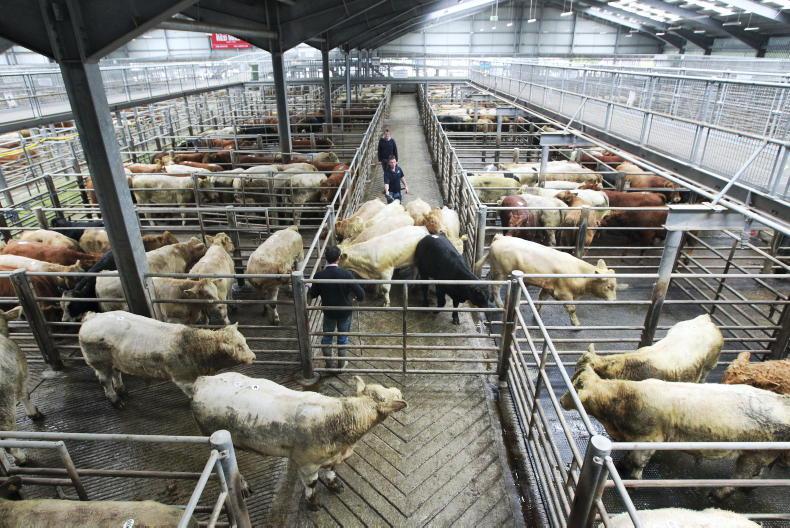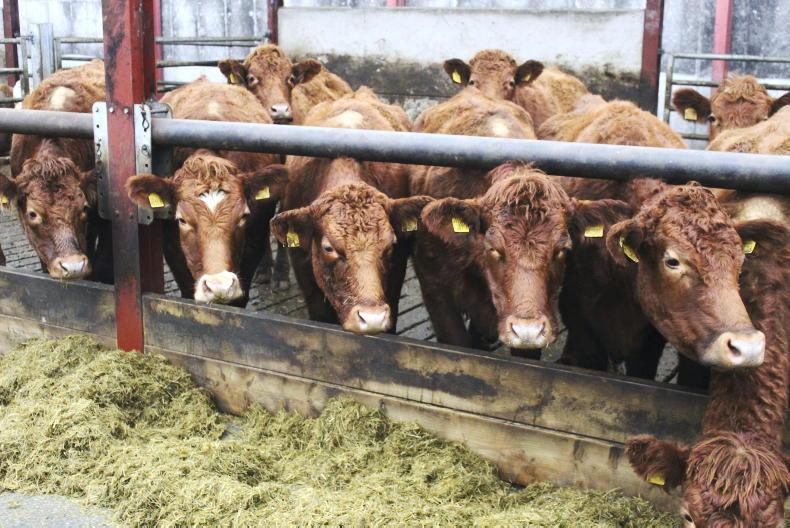The value of Irish food and drink exports to China grew 5% last year to reach €907m, more than double the value in 2013. Both the Chinese beef and dairy market presents the best potential for growth of any market in the world. The challenge for Ireland is how to maximise the return from that market.
Dairy to China – five things
you need to know
1 The Irish dairy industry has experienced exceptional growth in China, growing to an export value of €666.4m in 2017, almost five times the value in 2012.
2 In value terms, infant formula accounts for 93% of Irish dairy exports, worth €617.7m last year.
3 A history of domestic food safety scandals mean that China’s middle-class consumers are highly concerned for their children’s health and will pay a high premium for imported product.
4 13% of infant formula sold in China last year was Irish, making Ireland the fourth largest supplier behind the Netherlands, New Zealand and France. On top of this, a significant percentage of Dutch infant formula uses Irish ingredients as a base powder. Irish milk powder has successfully moved into the premium segment.
5 Kerrygold and Avonmore milk, are two dairy brands also present in China. The milk offering is a UHT product and, according to Bord Bia, when it arrived in the market originally was a premium product, retailing at the equivalent of €3 per litre. However, intense competition from Australian, New Zealand and other EU suppliers in this market have pushed prices downwards to currently around the equivalent of €1 per litre.

Beef to China – five things you need to know
1Ireland is currently the only EU country allowed to export beef to China.
2Three Irish plants are approved to export frozen, boneless beef from cattle under 30 months old to mainland China: Foyle Donegal, Slaney Foods, ABP Clones.
3Annual per-capita beef consumption is low at 6kg but the Chinese appetite for beef is growing fast.
4The Chinese already eat 9m tonnes of beef and consumption is expected to rise 2.9% a year to 2022, to reach 10.4m tonnes.
5China officially imported 700,000t of beef last year. Seventy per cent of these imports are sourced from South American countries, and another 29% from Australia and New Zealand. China has accelerated the rate at which it provides access in recent years, with 14 countries (including Ireland) now approved. Bord Bia expects 100,000t of beef from the EU could be imported by China by 2020, with a significant part of this coming from Ireland.

China to ‘rewrite the rules’ of agri-food trade
China’s ongoing agricultural policy shake-up will have a major impact on food producing countries around the world, according to European experts. An overhaul of the country’s agriculture and food government agencies underpins a shift in policy from self-sufficiency to sustainability. “China wants to be the consumer rather than the producer of the world,” according to Erlend Ek, analyst with the consultancy China Policy. With less than 10% of the world’s arable land but more than 20% of its population, the Chinese authorities are aware that they need to look elsewhere to feed an increasingly affluent population while addressing environmental pressures.

Minister Michael Creed with Bord Bia Chief Executive Tara Mc Carthy at the beginning of the Bord Bia trade mission led by the Minister to ChinaMinister Michael Creed with Bord Bia chief executive Tara Mc Carthy at the beginning of the Bord Bia trade mission led by the Minister to China.
The Government is expected to soon clarify how it will intervene on agricultural commodity imports. This has so far happened on an ad-hoc basis to avoid excessive price fluctuations on sensitive markets such as grains and pork. It is expected the authorities will establish futures markets and give clear indications of the price thresholds that would trigger Government intervention. This is already happening with oil and iron. Soyabean and pork are likely to be next.
Phil Hogan, European Commissioner for Agriculture said after meeting the Chinese minister for agriculture, the head of the market regulation administration and the vice-premier this week, he was “confident that other member states will get approval in 2018”.
Des Hurley, head of International sales, Lakeland: “I return to Ireland convinced that huge potential remains in China that has not yet been exploited. From various engagements with retailers, China is not a price but quality and safety driven market, criteria which Irish suppliers can comfortably meet”.
Cormac Healy, senior director of Meat Industry Ireland, said: “This is a market of serious scale and if Ireland is to really capture the potential here, we need to get all our meat plants approved.”
Tariffs on Irish beef imports into China
While Ireland has many advantages on entering the expanding Chinese beef market from a product reputation perspective, we are not in as good a place from a tariffs perspective as our New Zealand and Australian competitors.
Both Australia and New Zealand have free-trade deals agreed with China which are working towards a zero tariff on beef imports over a 10-year period. NZ are now getting close to the magical zero tariff while Australia is currently paying around 7%. The EU doesn’t have any Free Trade deal arrangement with China, so Irish beef will be entering the Chinese market subject to 12% import tariffs, the same as is paid by South American, US and Canadian suppliers. All imported meat to China is subject to VAT, at 10%.
EU meat exporters scramble to follow Irish beef into China
The race for second place is pitting the Netherlands against France. If French exports were restricted to frozen beef like Ireland’s, this would put the two countries in competition for China’s high-end market. There is less direct overlap with the Netherlands, where restaurants are asking for European veal. Poland is planning to take advantage of its geographical position to use Chinese incentives to fill trains used to export goods to Europe and currently returning empty. The 14-day journey would be suited to chilled cuts.
Read more
China: a cashless, online society
Editorial: Chinese dragon roars for Irish beef – but who will benefit?
The value of Irish food and drink exports to China grew 5% last year to reach €907m, more than double the value in 2013. Both the Chinese beef and dairy market presents the best potential for growth of any market in the world. The challenge for Ireland is how to maximise the return from that market.
Dairy to China – five things
you need to know
1 The Irish dairy industry has experienced exceptional growth in China, growing to an export value of €666.4m in 2017, almost five times the value in 2012.
2 In value terms, infant formula accounts for 93% of Irish dairy exports, worth €617.7m last year.
3 A history of domestic food safety scandals mean that China’s middle-class consumers are highly concerned for their children’s health and will pay a high premium for imported product.
4 13% of infant formula sold in China last year was Irish, making Ireland the fourth largest supplier behind the Netherlands, New Zealand and France. On top of this, a significant percentage of Dutch infant formula uses Irish ingredients as a base powder. Irish milk powder has successfully moved into the premium segment.
5 Kerrygold and Avonmore milk, are two dairy brands also present in China. The milk offering is a UHT product and, according to Bord Bia, when it arrived in the market originally was a premium product, retailing at the equivalent of €3 per litre. However, intense competition from Australian, New Zealand and other EU suppliers in this market have pushed prices downwards to currently around the equivalent of €1 per litre.

Beef to China – five things you need to know
1Ireland is currently the only EU country allowed to export beef to China.
2Three Irish plants are approved to export frozen, boneless beef from cattle under 30 months old to mainland China: Foyle Donegal, Slaney Foods, ABP Clones.
3Annual per-capita beef consumption is low at 6kg but the Chinese appetite for beef is growing fast.
4The Chinese already eat 9m tonnes of beef and consumption is expected to rise 2.9% a year to 2022, to reach 10.4m tonnes.
5China officially imported 700,000t of beef last year. Seventy per cent of these imports are sourced from South American countries, and another 29% from Australia and New Zealand. China has accelerated the rate at which it provides access in recent years, with 14 countries (including Ireland) now approved. Bord Bia expects 100,000t of beef from the EU could be imported by China by 2020, with a significant part of this coming from Ireland.

China to ‘rewrite the rules’ of agri-food trade
China’s ongoing agricultural policy shake-up will have a major impact on food producing countries around the world, according to European experts. An overhaul of the country’s agriculture and food government agencies underpins a shift in policy from self-sufficiency to sustainability. “China wants to be the consumer rather than the producer of the world,” according to Erlend Ek, analyst with the consultancy China Policy. With less than 10% of the world’s arable land but more than 20% of its population, the Chinese authorities are aware that they need to look elsewhere to feed an increasingly affluent population while addressing environmental pressures.

Minister Michael Creed with Bord Bia Chief Executive Tara Mc Carthy at the beginning of the Bord Bia trade mission led by the Minister to ChinaMinister Michael Creed with Bord Bia chief executive Tara Mc Carthy at the beginning of the Bord Bia trade mission led by the Minister to China.
The Government is expected to soon clarify how it will intervene on agricultural commodity imports. This has so far happened on an ad-hoc basis to avoid excessive price fluctuations on sensitive markets such as grains and pork. It is expected the authorities will establish futures markets and give clear indications of the price thresholds that would trigger Government intervention. This is already happening with oil and iron. Soyabean and pork are likely to be next.
Phil Hogan, European Commissioner for Agriculture said after meeting the Chinese minister for agriculture, the head of the market regulation administration and the vice-premier this week, he was “confident that other member states will get approval in 2018”.
Des Hurley, head of International sales, Lakeland: “I return to Ireland convinced that huge potential remains in China that has not yet been exploited. From various engagements with retailers, China is not a price but quality and safety driven market, criteria which Irish suppliers can comfortably meet”.
Cormac Healy, senior director of Meat Industry Ireland, said: “This is a market of serious scale and if Ireland is to really capture the potential here, we need to get all our meat plants approved.”
Tariffs on Irish beef imports into China
While Ireland has many advantages on entering the expanding Chinese beef market from a product reputation perspective, we are not in as good a place from a tariffs perspective as our New Zealand and Australian competitors.
Both Australia and New Zealand have free-trade deals agreed with China which are working towards a zero tariff on beef imports over a 10-year period. NZ are now getting close to the magical zero tariff while Australia is currently paying around 7%. The EU doesn’t have any Free Trade deal arrangement with China, so Irish beef will be entering the Chinese market subject to 12% import tariffs, the same as is paid by South American, US and Canadian suppliers. All imported meat to China is subject to VAT, at 10%.
EU meat exporters scramble to follow Irish beef into China
The race for second place is pitting the Netherlands against France. If French exports were restricted to frozen beef like Ireland’s, this would put the two countries in competition for China’s high-end market. There is less direct overlap with the Netherlands, where restaurants are asking for European veal. Poland is planning to take advantage of its geographical position to use Chinese incentives to fill trains used to export goods to Europe and currently returning empty. The 14-day journey would be suited to chilled cuts.
Read more
China: a cashless, online society
Editorial: Chinese dragon roars for Irish beef – but who will benefit?












SHARING OPTIONS